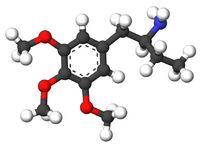Chemistry:AEM (psychedelic)
From HandWiki

| |

| |
| Names | |
|---|---|
| Preferred IUPAC name
1-(3,4,5-Trimethoxyphenyl)butan-2-amine | |
| Other names
Alpha-ethyl mescaline
3,4,5-Trimethoxy-alpha-ethylphenethylamine 3,4,5-Trimethoxy-1-ethyl-(alpha-ethyl)amine | |
| Identifiers | |
3D model (JSmol)
|
|
| ChemSpider | |
PubChem CID
|
|
| UNII | |
| |
| |
| Properties | |
| C13H21NO3 | |
| Molar mass | 239.31 g/mol |
| Legal status |
|
Except where otherwise noted, data are given for materials in their standard state (at 25 °C [77 °F], 100 kPa). | |
| Infobox references | |
Tracking categories (test):
AEM (alpha-ethylmescaline or 3,4,5-trimethoxy-alpha-ethylphenethylamine) is a lesser-known psychedelic drug. It is an analog of mescaline. AEM was first synthesized by Alexander Shulgin. In his book PiHKAL, the minimum dosage is listed as 220 mg, and the duration unknown.[1] AEM produces few to no effects. Very little data exists about the pharmacological properties, metabolism, and toxicity of AEM.
See also
- Phenethylamine
- Psychedelics, dissociatives and deliriants
References

